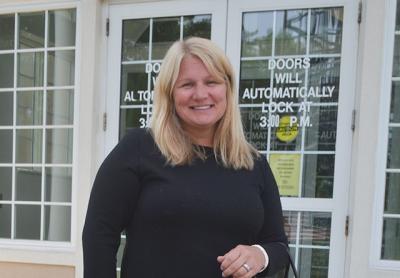Montauker Guides Legal Aid

She grew up in Montauk, where her father, William Carew, practiced law. Now, she is the supervisor of the Legal Aid Society’s East End bureau, overseeing attorneys in 11 village and town justice courts. Her name is Cynthia Darrell, and, after 18 years of service with the Legal Aid Society, she says love of the job, and the search for justice, keeps her going.
In May, Ms. Darrell replaced Sabato Caponi, who became the chief operating officer of the society’s Suffolk County Criminal Division. Speaking on Tuesday of the organization’s role in the justice system, she said, “It is not just to deal with the criminal charges. It is the well-being of our clients in general.”
Beyond offering indigent defendants attorneys to handle criminal matters, for which the society is widely known, it also has lawyers who specialize in immigration law. The status of undocumented residents facing criminal charges is an area where a holistic approach is required, she said.
Increasing numbers of deportations have changed the way the society now handles even standard, low-level criminal charges. When a judge asks defendants if they are citizens, society lawyers instruct their clients not to reply. The wrong answer could trigger a detainer request from Immigration and Customs Enforcement.
It is an evolving legal landscape, she said, particularly since, in immigration courts, the mere suspicion of having committed a crime can be enough to trigger deportation. “The answers from yesterday may not be the answers tomorrow, which may not be the answers five years from now,” she said.
To illustrate another aspect of her work, Ms. Darrell referred to narcotics crimes. She said that if the accused was of the mind-set to get treatment, the best approach might be to get them into in-house treatment, “to get them out of their addiction.” The Riverhead and Southampton Town Justice Courts have drug divisions, which offer such alternative approaches.
The one thing no attorney wants to experience, she said, “is when you hear your client is not coming to court because they have died from an overdose.” She said the Legal Aid Society’s “main goal is rehabilitation, not punishment.” Mentoring young attorneys is a part of Ms. Darrell’s position that she finds gratifying. She described a recent jury trial in East Hampton Town Justice Court. James Arceri had been accused of hitting a bicyclist on Cranberry Hole Road in Amagansett in 2014 and driving away. His attorney was Matthew D’Amato, who is regularly assigned by the society to East Hampton Town Justice Court. Since it was only Mr. D’Amato’s second trial, Ms. Darrell offered counsel on pre-trial motions and strategized throughout the process.
She and Mr. D’Amato believed the prosecution’s case had a fundamental flaw: Two people at the scene had seen the biker go down, but did not know the cause of the spill. They had not seen Mr. Arceri’s pickup truck strike the victim. Having made this information clear, the jury came back shortly after being sent out with a not-guilty verdict. Mr. D’Amato had already won his first trial in East Hampton, so this was his second.
Other defendants who may benefit from an inclusive approach are troubled military veterans, Ms. Darrell said. In addition to the special drug court, Southampton Town has a veterans court to which East End defendants can have their cases directed.
“My father was a lawyer. He inspired me to become a lawyer,” Ms. Darrell said. Losing him to cancer was a painful moment in her life, she added.
Her husband is Trevor Darrell, an East Hampton attorney with Fleming and Darrell. The couple have two sons, 10 and 12, and she is the secretary of the East Hampton Middle School PTA. The family also has two adopted dogs and a cat. “It’s a balancing act, but it is all good.”
Acknowledging that private practice would prove much more lucrative, Ms. Darrell said of the Legal Aid Society, “I would have left a long time ago, if I didn’t love it.”
